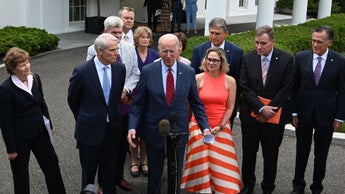
President Biden on Thursday announced he’d reached an infrastructure deal with a group of Republican and Democratic senators, saying both sides gave up some things they wanted to get a rare accord in a bitterly divided Washington, D.C.
Biden acknowledged the deal would not include proposals he’s made for spending to help American families, but firmly endorsed the deal on infrastructure in unusual remarks just outside the White House with the bipartisan group of senators looking on.
“We have a deal,” Biden told reporters.
President Biden on #infrastructure: "We had a really good meeting…we have a deal."
Full video here: https://t.co/U970zd6DRR pic.twitter.com/4pMjJIcNH1
— CSPAN (@cspan) June 24, 2021
“I think it’s really important, we’ve all agreed that none of us got all that we wanted. I clearly didn’t get all I wanted. They gave more than I think maybe they were inclined to give in the first place,” he said.
“But this reminds me of the days we used to get an awful lot done in the United States Congress, we actually worked with one another,” Biden said, putting his hand on Sen. Rob Portman’s (R-Ohio) shoulder. “Bipartisan deal means compromise.”
The agreement was reached after weeks of negotiations, and with progressive Democrats repeatedly calling on the White House to back away from the talks, which some liberals fear could prevent a much larger package from moving forward.
Biden said he did intend to continue to look for a larger package on spending through a budget reconciliation measure, which would allow it to pass the Senate with just Democratic votes.
“I appreciate the fact that the president came out today to express what we all believe, which is we didn’t get everything we wanted but we came up with a compromise that is going to help the American people,” Portman told reporters. “I’m pleased to see today we were able to come together on a core infrastructure package.”
Sen. Susan Collins (R-Maine) said that the group had agreed on a price tag, scope and how to pay for it.
The framework includes $579 billion in new spending over five years for a total of $973 billion over five years and just over $1.2 trillion over eight years.
It allocates $312 billion for transportation programs, including roads, bridges, airports and electric vehicles infrastructure. The remaining $266 billion would go to water infrastructure, broadband, environmental remediation, power infrastructure and other areas.
The proposed financial sources for new investments include reducing the tax gap, redirecting unused unemployment insurance relief funds and repurposing unused funds from COVID-19 relief legislation passed last year. It also includes sources like allowing states to sell or purchase unused toll credits for infrastructure, extending expiring customs user fees and 5G spectrum auction proceeds.
“It was not easy to get agreement on all three, but it was essential,” Collins said. “It was essential to show the American people the Senate can function, that we can work in a bipartisan way.”
Signs of a bipartisan breakthrough on infrastructure came Wednesday evening, when the group of senators emerged from a meeting with top White House officials saying that they had agreed to a framework and would meet with Biden on Thursday.
Biden, who unveiled a $1.25 trillion package to repair infrastructure and address climate change at the end of March, has sought for weeks to get a bipartisan agreement on infrastructure, after campaigning on his ability to work across the aisle and cut deals in Congress when he represented Delaware as a senator.
Biden also held negotiations with a separate Republican group led by Sen. Shelley Moore Capito (W.Va.) that collapsed earlier this month, fueling skepticism about the possibility for bipartisan agreement.
Democrats moved Biden’s $1.9 trillion coronavirus relief bill without GOP votes earlier this year using budget reconciliation, a process that allows them to bypass the filibuster in the Senate.
While the bipartisan breakthrough represents a significant accomplishment, Biden still faces a challenge in getting a deal across the finish line especially as he looks to convince progressives to support the deal.
Speaker Nancy Pelosi (D-Calif.) said Thursday that the House would not vote on a bipartisan infrastructure bill until the Senate passes a larger set of Democratic priorities through budget reconciliation.
Biden told reporters following remarks later Thursday that he would not sign the bipartisan infrastructure bill unless a reconciliation bill also makes it to his desk — a move that is likely to ease concerns from progressives but complicate passing both measures.
“If only one comes to me, this is the only one that comes to me, I’m not signing it. It’s in tandem,” the president said.
Biden and the senators emphasized that the deal was a matter of compromise, and that both sides had to make concessions in order to reach an agreement.
“We all gave some to get some because what we did was put first the needs of our country,” said Sen. Krysten Sinema (D-Ariz.), who described the bipartisan deal as an “historic investment” in the United States’s infrastructure.
Sen. Joe Manchin (D-W.Va.) called the deal a “tremendous opportunity for us to show the rest of the world that we can still get big things done in a bipartisan way.”
Sen. Mitt Romney (R-Utah) added that he is confident the bill can get through Congress, touting Biden’s support behind it.
“America works, the Senate works, and we can work together,” he said.
Via The Hill
